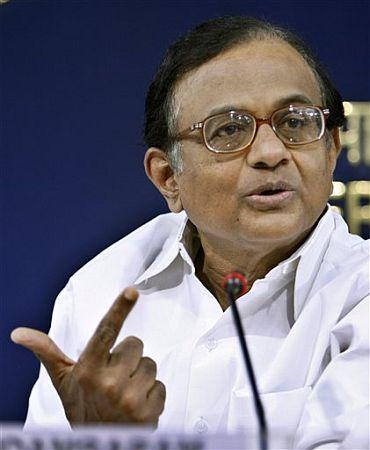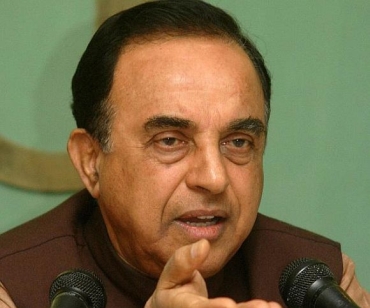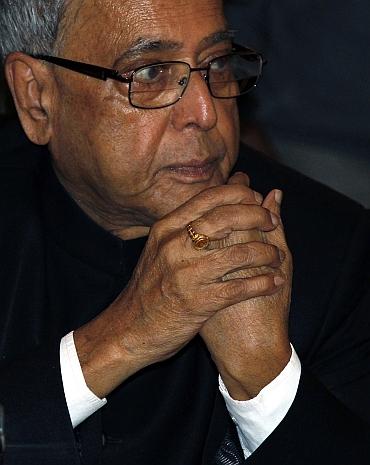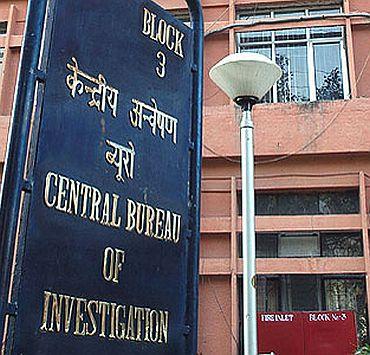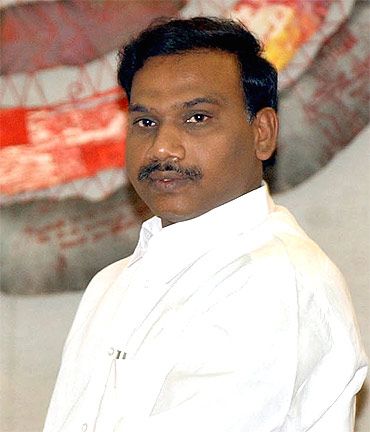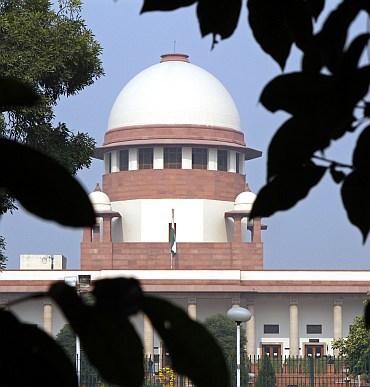 | « Back to article | Print this article |
2G scam: SC grants reprieve to Chidambaram for 2 weeks
While pronouncing its judgment on the petitions seeking a direction for a probe into the alleged role of Home Minister P Chidambaram in the 2G spectrum scam, the Supreme Court on Thursday referred the matter to the trial court.
The judgments was pronounced by a bench comprising Justices G S Singhvi and A K Ganguly, which had reserved its verdict on the plea for probe against Chidambaram and for cancellation of licences of spectrum on October 10 and March 17 respectively last year.
The petitions on both the issues were filed by NGO Centre for Public Interest Litigation and Janata Party chief Subramanian Swamy.
The apex court also refused to direct the Central Bureau of Investigation to probe the alleged role of Chidambaram in the case. It left it to the trial court to decide on a probe against Chidambaram in 2G case.
It has asked the trial court to decide on the home minister within two weeks.
Hailing the judgment, Janata Party chief Subaramanian Swamy said, "This is the best judgment that could be possible. The country can be justifiably proud of Supreme Court."
"2G is a big scam and it is the collective failure of the government," he said.
Click on NEXT for more...
For Rediff Realtime News on the 2G scam, click here
2G scam: SC grants reprieve to Chidambaram for 2 weeks
It was also alleged by the petitioners that Chidambaram had advised Raja that it was legal to "dilute" the shares by telecom companies after getting licenses, through which Swan Telecom and Unitech Wireless got huge profits by selling 45 per cent and 60 per cent respectively to two foreign firms Etisalat and Telenor.
Bhushan had said the facts stated that a finance ministry note pointed to a "clear fact" that officials of the finance ministry repeatedly pointed out that spectrum allocation could not be determined by the entry fee of 2001.
"That it should be allocated through a market discovered price. It was impossible for Raja to move ahead without the concurrence of the then finance minister," he had said.
"Despite the fact that the finance secretary had taken such a strong view which had been recorded in the DoT's approach paper, Chidambaram chose to side with Raja on the issue of pricing," he had said.
In the case related to cancellation of licenses, people from civil society also approached the apex court to reverse the decision taken by Raja for telecom licenses during his tenure as telecom minister.
Click on NEXT for more...
For Rediff Realtime News on the 2G scam, click here
2G scam: SC grants reprieve to Chidambaram for 2 weeks
Former chief election commissioner J M Lyngdoh, T S Krishnamurthy and N Gopalaswami, along with former central vigilance commissioner P Shankar, moved the SC along with CPIL and Swamy.
They alleged that Raja's decision was marred by "multiple illegalities, corruption and favouritism".
The proceeding in the case had witnessed a virtual telecom war with the old service providers contending spectrum allotted to them are valid and they should not be compared with new players whose licenses are under the judicial scrutiny.
The role of Chidambaram in the 2G scam was raised in the Supreme Court by the petitioners who had pointed out that there was evidence on record showing that the decision regarding pricing of spectrum was taken jointly by him and Raja.
A finance ministry note to the PMO signed by Pranab Mukherjee was also taken on record by the apex court in which it was stated that the scam could have been averted had Chidambaram suggested the policy of auction instead of the first-come-first-serve policy on allocation of spectrum.
Click on NEXT for more...
For Rediff Realtime News on the 2G scam, click here
2G scam: SC grants reprieve to Chidambaram for 2 weeks
The Centre and the Central Bureau of Investigation had vehemently opposed any probe against Chidambaram, who was the finance minister at the time of allotment of spectrum in 2008.
They had maintained that Chidambaram was not in direct communication with the then telecom minister A Raja in determining the price of the radio waves.
However, Swamy and the Centre for Public Interest Litigation had refuted the claims of CBI and the Centre that Chidambaram was not in the picture till January, 10, 2008, when the Department of Telecommunication headed by Raja issued 122 Letters of Intent to telecom companies without following the policy of auction.
Swamy and CPIL's counsel Prashant Bhushan had contended that Chidambaram was "consistently" informed of what was going on and "till November 30, 2007, Chidambaram was apprised of what Raja was up to".
Swamy and Bhushan said the finance ministry officials were for allocation of spectrum through auction but they were overruled by Chidambaram.
Click on NEXT for more...
For Rediff Realtime News on the 2G scam, click here
2G scam: SC grants reprieve to Chidambaram for 2 weeks
Swamy said there were documents to show that Raja and Chidambaram met four times on the issue and had a meeting of minds in the commission of the offences.
Established companies like Vodafone and Aircel opposed the contentions of Swan, Videocon and Shyam Telecom which had pleaded that if the court decides to cancel their allotment of spectrum, it should be applied retrospectively from 1995 as the natural resources have been allotted under the same policy.
The companies had claimed their contract with the government on spectrum allotment cannot be quashed once it has been agreed upon.
The petitioners had contended that even the telecom sector regulator TRAI has recommended cancellation of 69 out of the 122 licences as the licencees had failed to roll out their services in time as per the conditions stipulated for grant of licences.
Click on NEXT for more...
For Rediff Realtime News on the 2G scam, click here
2G scam: SC grants reprieve to Chidambaram for 2 weeks
The bench had earlier issued notices to TRAI and 11 private telecom companies which were granted licences despite allegedly being ineligible to secure them or had failed to launch services within the stipulated time-frame.
The telecom firms which were issued notices included Etisalat, Uninor, Loop Telecom, Videocon, S-Tel, Allianz Infra, Idea Cellular, Tata Teleservices, Sistema Shyam Teleservices, Dishnet Wireless and Vodafone-Essar.
The telecom companies, which had come under scrutiny for having allegedly benefited in the 2G spectrum scam had, however, refuted any illegality in allotment of spectrum and told the Supreme Court that allocation of the air waves since 2003 should be scrapped if the first-come-first-serve policy adopted during Raja's tenure as telecom minister is to be held illegal.
Click on NEXT for more...
For Rediff Realtime News on the 2G scam, click here
